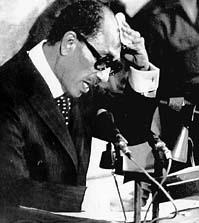Anwar Sadat
Today is the anniversary of the 1981 assassination of Egyptian President Anwar Sadat, one of the most complex and fascinating leaders of the Arab world. He is remembered worldwide mainly for being the first Arab leader to recognize Israel, and for signing a peace accord with Israeli Prime Minister Menachem Begin in 1978 at Camp David. He is seen here delivering his historic address to the Knesset (the Israeli parliament) on 20 November 1977.
 Ironically today is also the date on which Sadat (together with Syria) started the Yom Kippur War against Israel in 1973.
Ironically today is also the date on which Sadat (together with Syria) started the Yom Kippur War against Israel in 1973. It was in foreign affairs that Sadat made his most dramatic efforts. Feeling that the Soviet Union gave him inadequate support in Egypt's continuing confrontation with Israel, he expelled thousands of Soviet technicians and advisers from the country in 1972. The following year he launched, with Syria, a joint invasion of Israel that began the Arab-Israeli war of October 1973. The Egyptian army achieved a tactical surprise in its attack on the Israeli-held Sinai Peninsula, and, though Israel successfully counterattacked, Sadat came out of the war with greatly enhanced prestige as the first Arab leader to actually retake some territory from Israel.However all was not well:
After the war, Sadat began to work toward peace in the Middle East. He made a historic visit to Israel (Nov. 19-20, 1977), during which he traveled to Jerusalem to place his plan for a peace settlement before the Knesset (Israeli Parliament). This initiated a series of diplomatic efforts that Sadat continued despite strong opposition from most of the Arab world and the Soviet Union. The U.S. president Jimmy Carter mediated the negotiations between Sadat and Begin that resulted in the Camp David Accords (Sept. 17, 1978), a preliminary peace agreement between Egypt and Israel. Sadat and Begin were awarded the Nobel Prize for Peace in 1978; and their continued political negotiations resulted in the signing on March 26, 1979, of a treaty of peace between Egypt and Israel, the first between the latter and any Arab nation.
In September of 1981, Sadat cracked down on Muslim organizations and Coptic organizations, including student groups; the arrests totalled nearly 1600, earning worldwide condemnation for the extremity of his techniques.Despite his shortcomings in the handling of domestic affairs it behooves us to remember this extraordinary individual, who took courageous steps in changing the face of the Middle East.
Meanwhile, internal support for Sadat disappeared, due to his style of government, an economic crisis and the suppression of dissidents. On October 6, the month after the crackdown, Sadat was assassinated during a parade in Cairo, by army members who were part of the Egyptian Islamic Jihad organization, who opposed Sadat's negotiations with Israel, as well as his use of force in the September crackdown.
The army members killed him by throwing grenades and shooting assault rifle rounds into the Presidential booth. Many were wounded in the assassination, including future U.N. Secretary General Boutros Boutros Ghali and visiting guest James Tully, the Irish Minister for Defence. Sadat was succeeded by his Vice-President Hosni Mubarak.

No comments:
Post a Comment